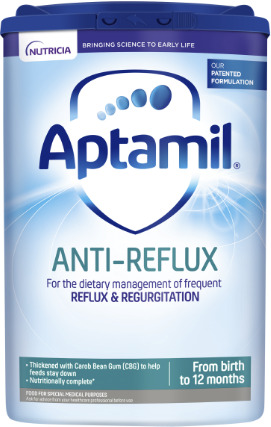FEATURED BRAND
Common infant feeding problems
For healthcare professional use only.
Infant feeding problems can be common and can present with a variety of symptoms. You can advise parents and caregivers to look out for the following frequent symptoms:
- Poor appetite and lack of energy
- Refusal of food
- Vomiting or regurgitation (posseting)
- Frequent hiccups.
These symptoms can be signs of reflux, colic, constipation or lactose intolerance.
Reflux in babies occurs when the contents of the stomach move back into the oesophagus after feeding. Babies may experience reflux after feeding, coughing or hiccupping, or if they gulp after being burped or fed.
Practical hints and tips for managing reflux
Reflux is common and usually gets better on its own.
Below are some suggestions you can offer parents and caregivers to support their infant with reflux.
You can advise parents or caregivers to position their baby in an upright position when feeding, and to wait 30 minutes before laying them flat
If bottle feeding, they should check the hole in the teat is not too large, as this can cause babies to gulp their feed too quickly
Ensure they are feeding their babies in smaller quantities and winding the infant before, during and after feeds
If they are formula feeding, advise them to speak to a healthcare professional for information on specialist milks for dietary management.
Breastfeeding is best for babies. Aptamil Anti-Reflux is a food for special medical purposes for the dietary management of frequent reflux and regurgitation. This should only be used under medical supervision, after full consideration of the feeding options available including breastfeeding. Suitable for use as the sole source of nutrition for infants from birth and as part of a balanced diet from 6-12 months. This product should not be used in combination with antacids or other thickeners and is not suitable for premature infants.
Refer to label for details.

